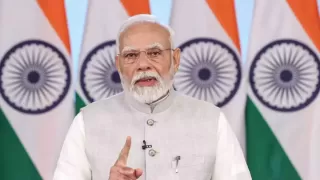The popular social networking app TikTok may soon face a ban in the US, which would be a huge move. President Biden signed a measure requiring TikTok's Chinese parent firm, ByteDance, to sell its app or risk a statewide ban. This is when the decision was made. On April 24, 2024, this law was passed as a component of a broader emergency relief package worth $95.3 billion that was given to Taiwan, Israel, and Ukraine.
The 'Protecting Americans’ Data From Foreign Adversaries Act of 2024' is a law that tries to address national security concerns about foreign enemies potentially misusing user data from American users.
Because of ByteDance's connections to Beijing, the US administration has voiced concerns that TikTok may be 'weaponized' by the Chinese government. There is concern that Chinese Communist Party members, particularly those in the military and administration, may spy on the people of the United States. ByteDance maintains that it does not provide Chinese authorities with user data from Americans, refuting these accusations time and time again. Nevertheless, the new legislation states that the TikTok ban would go into force 270 days after it is enacted, or on January 15, 2025, if ByteDance does not comply with a 'qualified divestiture'. Additionally, if the transaction is still being negotiated, there is a clause that allows for a one-time extension of up to ninety days.
Important provisions of the bill include:
1. Within six months of the bill's passage, ByteDance, TikTok's Chinese parent firm, is required by law to sell its interests in the app. If this isn't done, there will be harsh penalties, which may even include platform bans.
2. In the case of divestiture, ByteDance's proprietary algorithm would need to be given up if TikTok was to be permitted to go on business in the US. The task of selecting and customising material for users falls to this algorithm.
3. ByteDance will be prohibited from selling TikTok's app on key app stores like Google and Apple if it doesn't follow the divestiture criteria. Furthermore, TikTok may not be hosted by web hosting companies until divestiture takes place.
4. The measure gives the President the power to decide if TikTok is no longer governed by a foreign enemy through an interagency procedure.
Why was TikTok banned in India?
In June 2020, the TikTok app was discontinued for Indian customers. The Indian government expressed worries over privacy, claiming that the Chinese applications endanger the security and sovereignty of the nation. Following a military skirmish along the border between China and India, India blocked many additional Chinese applications in addition to TikTok.
The action received strong support in India, where protesters have been calling for a boycott of Chinese goods ever since the deadly fighting in the remote Karakoram mountain area. India has already imposed restrictions on Chinese company investment months before the ban.
According to newswire AP, Nikhil Pahwa, a digital policy specialist and the creator of the internet website MediaNama, 'TikTok wasn't a one-off case. Today, India has banned over 500 Chinese apps to date.'
In what ways is it different from the US ban?
Since the prohibition in India was implemented quickly and Chinese firms were given time to address privacy concerns, it was made permanent in January 2021. In the US, though, things are different because of the larger revenue market, which makes things difficult.
TikTok chose not to file a lawsuit in India, but the US represents a larger cash stream for them. It would also be more difficult for the US to implement this than it was for India because of the strength of the First Amendment in the US 'said Nikhil Pahwa, a digital policy specialist and the creator of the tech website MediaNama.
According to Pahwa, since the applications might be dangerous for national security, nations should evaluate how dependent they are on China and figure out how to lessen it. In addition to being prohibited in several European nations, the TikTok app is outlawed in Pakistan, Nepal, and Afghanistan.
Other nations' actions:
TikTok has been completely or partially banned in several nations because of worries about content control, national security, and data privacy. Afghanistan, India, Iran, Kyrgyzstan, Nepal, and Somalia are among the countries that have fully banned users from TikTok. Every individual in these nations has limited access to TikTok; users cannot download or use the app.
Furthermore, a few locations have partially banned TikTok users, mostly government or public sector personnel. TikTok is prohibited on devices possessed by specific government bodies in Australia. Canada forbids the use of government-issued gadgets, whereas Belgium limits the use of TikTok on federal government work equipment. Employees of the Defence Ministry in Denmark are not allowed to use TikTok on their devices, and EU Council, Parliament, and Commission employees are not allowed to use TikTok on their devices either.
In a similar vein, Latvia limits the use of TikTok on work devices within the Latvian Ministry of Foreign Affairs, and France forbids the app on official phones given to government personnel. While Norway limits access to government work gadgets, New Zealand bans MPs and members of parliament from using TikTok while on work devices. Exclusions from TikTok are also in place for devices that are provided by the government in Taiwan and the UK.
Also Read: Mrunal Thakur says she is considering freezing her eggs






















